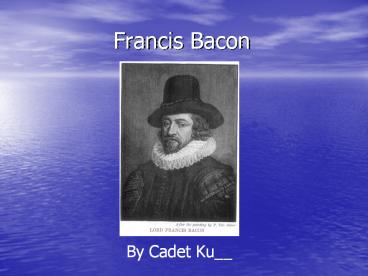Francis Bacon - PowerPoint PPT Presentation
1 / 6
Title:
Francis Bacon
Description:
Francis Bacon By Cadet Ku__ Francis Bacon Bacon, Francis, 1561-1626, English philosopher, essayist, and statesman, b. London, educated at Trinity College, Cambridge ... – PowerPoint PPT presentation
Number of Views:969
Avg rating:3.0/5.0
Title: Francis Bacon
1
Francis Bacon
By Cadet Ku__
2
Bacon, Francis, 1561-1626, English philosopher,
essayist, and statesman, b. London, educated at
Trinity College, Cambridge, and at Gray's Inn. He
was the son of Sir Nicholas Bacon, lord keeper to
Queen Elizabeth I. Francis Bacon was a member of
Parliament in 1584 and his opposition to
Elizabeth's tax program retarded his political
advancement only the efforts of the earl of
Essex led Elizabeth to accept him as an
unofficial member of her Learned Council.
3
At Essex's trial in 1601, Bacon, putting duty to
the state above friendship, assumed an active
part in the prosecution-a course for which many
have condemned him. With the succession of James
I, Bacon's fortunes improved. He was knighted in
1603, became attorney general in 1613, lord
keeper in 1617, and lord chancellor in 1618 he
was created Baron Verulam in 1618 and Viscount
St. Albans in 1621. In 1621, accused of accepting
bribes as lord chancellor, he pleaded guilty and
was fined 40,000, banished from the court,
disqualified from holding office, and sentenced
to the Tower of London.
4
Bacon's great claim to fame is not that he
entered Trinity College, Cambridge, at the age of
12, not that he was Lord Chancellor of England
under James I, nor even that he has been reputed
the real writer of Shakespeare's plays, but that
he was a philosopher of the first rank and the
effective founder of the modern, experimental,
scientific, approach to understanding.
5
Before Bacon, 'learning' largely meant memorizing
the classics, especially Aristotle, and acceding
to every dictat of established religion. In The
Advancement of Learning, he argued that the only
knowledge of importance was that which could be
discovered by observation- 'empirical' knowledge
rooted in the natural world.
6
The End































